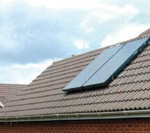A project set up to provide thousands of social tenants with solar PV panels is under threat after the Government announced a comprehensive review of feed-in tariff subsidies.
 The social enterprise behind the initiative, Empower Community, fears the UK Government – the ‘greenest ever’ to take office according to Prime Minister David Cameron – will slash subsidies that had been earmarked for some 22,000 social tenants in Lincolnshire, Wales, East Anglia and Yorkshire.
The social enterprise behind the initiative, Empower Community, fears the UK Government – the ‘greenest ever’ to take office according to Prime Minister David Cameron – will slash subsidies that had been earmarked for some 22,000 social tenants in Lincolnshire, Wales, East Anglia and Yorkshire.
Managing partner of Empower Community, Alex Grayson, said: “I was gobsmacked when I heard [the news that the Government would likely slash funding]. The policy is being cut off at the knees”
Despite rumours to the contrary, the Department of Energy and Climate Change (DECC) has insisted that no policy change has been made as yet. A spokesperson for the department said: “We’ve made it clear that tariffs will remain unchanged until April 2012 unless the review indicates the need for greater urgency”.
DECC’s official line is unlikely to inspire confidence among social tenants who expected to reap the benefits of solar installations. Rumours circulating at present suggest the Government’s review will find the need for greater urgency, with cuts of up to 75 per cent expected to be introduced by January. Unfortunately, the anticipated cuts to feed-in tariff subsidies mean that many solar PV projects will not go ahead, including Empower Community’s pioneering plan to bring solar power to the masses.
Until recently, solar power has been the preserve of the wealthy in Britain. Social tenants are typically unable to afford solar panel installations and cannot, therefore, avail of the feed-in tariff subsidies. The feed-in tariff scheme (FITs) ensures that a set payment is made for solar energy exported to the National Grid. Under the scheme, households can currently expect to make a profit on solar panel installations over the 25 year period pertaining to FITs, but the cost of installing solar panels remains high.
If the Government does cut subsidies by up to 75 per cent, however, many solar PV projects will become unaffordable, meaning that thousands of social tenants, unable to pay for solar panel installations, will be unable to enjoy the benefits of using solar energy, which can slash annual electricity bills by up to £250.


